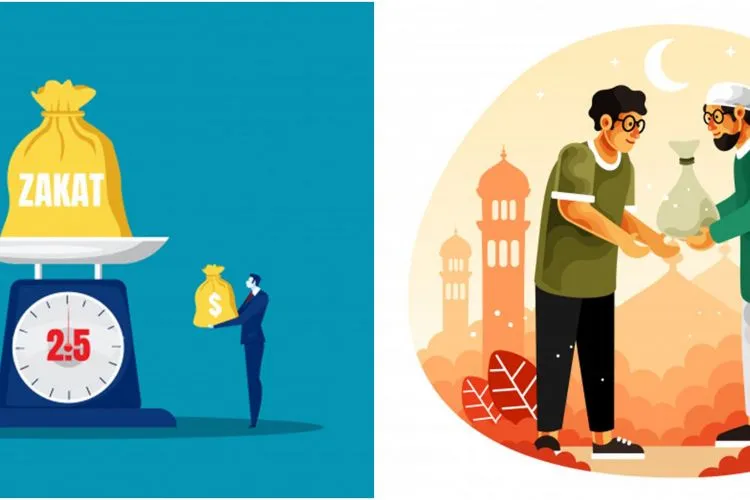Sabil Al-Quran
How Much Is Zakat Al Fitr?
Zakat Al Fitr is a beautiful act of giving that purifies the fast and spreads joy among those in need. As an essential obligation for every Muslim, it must be given before Eid prayer to ensure that the less fortunate can also celebrate this blessed occasion.
But how much should you give? Sabil Al-Quran provides clear guidance on the amount, who should pay, and how to distribute it effectively. Learn everything you need to fulfill this duty with sincerity and maximize the rewards of your charity this Ramadan.
What Is Zakat Al-Fitr in Islam?
Zakat al-Fitr is a mandatory charitable donation that every Muslim must give before the Eid al-Fitr prayer, marking the end of Ramadan. It serves as a means of purifying one’s fast from any shortcomings and ensuring that those in need can also partake in the joy of Eid.
The amount is typically measured in staple food items such as wheat, barley, dates, or their monetary equivalent. This act of giving not only strengthens community bonds but also reflects the spirit of generosity and care that Islam encourages.
Is Zakat Al-Fitr Obligatory?
Yes, Zakat al-Fitr is an obligatory charity that every Muslim must give before the Eid al-Fitr prayer. It is mandatory for every Muslim who possesses more than their basic needs and has enough food for themselves and their family for a day and night.
The obligation applies to every individual, including men, women, children, and even newborns, with the head of the household responsible for paying it on behalf of their dependents.
عَنِ ابْنِ عُمَرَ رَضِيَ اللَّهُ عَنْهُمَا قَالَ: فَرَضَ رَسُولُ اللَّهِ ﷺ زَكَاةَ الْفِطْرِ صَاعًا مِنْ تَمْرٍ، أَوْ صَاعًا مِنْ شَعِيرٍ، عَلَى الْعَبْدِ وَالْحُرِّ، وَالذَّكَرِ وَالْأُنْثَى، وَالصَّغِيرِ وَالْكَبِيرِ مِنَ الْمُسْلِمِينَ، وَأَمَرَ بِهَا أَنْ تُؤَدَّى قَبْلَ خُرُوجِ النَّاسِ إِلَى الصَّلَاةِ.
(رواه البخاري ومسلم)
Ibn Umar (may Allah be pleased with him) reported:
“The Messenger of Allah (ﷺ) made Zakat al-Fitr obligatory as one sa‘ of dates or one sa‘ of barley upon every Muslim, free or slave, male or female, young or old. He ordered that it be given before people go out for the prayer.”
(Bukhari & Muslim)

Importance Of Zakat Al-Fitr
Zakat al-Fitr is a fundamental obligation for every Muslim who can afford it, typically given before the Eid al-Fitr prayer at the end of Ramadan. It serves multiple purposes, both spiritual and social, reinforcing key Islamic values such as charity, gratitude, and community support.
1. Spiritual Purification
One of the key benefits of Zakat al-Fitr is its role in purifying the fasting person from any mistakes or shortcomings they may have committed during Ramadan. Whether it be improper speech, negative thoughts, or minor faults, this act of charity helps cleanse the soul and complete one’s fasting in a more perfect manner.
2. Helping the Less Fortunate
Islam strongly emphasizes taking care of those in need, and Zakat al-Fitr ensures that even the poorest members of society can enjoy the festivities of Eid. By providing food or financial assistance, it allows them to celebrate with dignity and happiness, preventing them from feeling excluded.
3. Strengthening Social Bonds
Zakat al-Fitr fosters a sense of unity and compassion within the Muslim community. By giving to those in need, wealth is redistributed in a way that promotes fairness and mutual care. This act of charity encourages gratitude and humility among those who give, while also uplifting those who receive.
4. A Mandatory Act of Worship
Unlike regular charity (Sadaqah), Zakat al-Fitr is an obligatory duty upon every Muslim who has the financial means. It must be given before the Eid prayer to ensure its timely distribution to those in need. This obligation highlights Islam’s commitment to social welfare and the well-being of the entire community.
5. A Reminder of Gratitude
By giving Zakat al-Fitr, Muslims express their gratitude for the blessings they have received during Ramadan. It serves as a reminder that wealth is a trust from Allah and should be used to help others, reinforcing the importance of generosity and compassion in daily life.
How Is Zakat Al-Fitr Calculated?
Zakat al-Fitr is calculated based on the measurement of one sa‘ (صاع) of staple food, which is approximately 2.5 to 3 kg of common food items such as:
- Wheat
- Barley
- Dates
- Raisins
- Rice or other staple grains
Steps to Calculate Zakat Al-Fitr
- Determine the Local Food Prices Find the cost of 2.5 to 3 kg of staple food in your area.
- Multiply by the Number of People Pay for yourself and each dependent in your household (spouse, children, parents, etc.).
- Pay in Food or Money While traditionally given as food, many scholars permit paying the equivalent amount in money.
Example Calculation:
- If 3 kg of rice costs $5, and you have a family of 4 members, then:
$5 × 4 = $20 as your total Zakat al-Fitr obligation.
To ensure you are giving the correct amount, check with your local mosque or Islamic organization for the latest Zakat al-Fitr rates in your region.

How Much Is Zakat Al Fitr per Person?
In modern times, many Islamic scholars and organizations allow monetary equivalents based on the local market value of staple food, The exact amount varies by country and can range from $5 to $15 per person, depending on food prices in that area.
When to Pay?
- It must be paid before the Eid prayer to ensure that the poor receive it in time for Eid celebrations.
- Delaying it beyond the prayer makes it invalid as Zakat and instead counts as a regular charity.
To find out the exact Zakat al-Fitr amount in your country, check with local Islamic centers or scholars to ensure you are giving the correct amount.
Ensure your Zakat al-Fitr is given on time and in the correct amount to fulfill this beautiful obligation of Ramadan. At Sabil Al-Quran, we provide you with the knowledge and guidance you need to calculate and distribute your Zakat properly. Don’t wait, give with sincerity and let your contribution bring joy to those in need this Eid.
Frequently Asked Questions About Zakat Al-Fitr
Who is required to pay Zakat Al-Fitr?
Zakat Al-Fitr is obligatory on every Muslim who has the financial means, including men, women, and children. The head of the household pays it on behalf of dependents.
When should Zakat Al-Fitr be given?
It must be given before the Eid prayer to be valid. It is preferable to distribute it a day or two before Eid al-Fitr to ensure it reaches the needy on time.
Can Zakat Al-Fitr be given in cash instead of food?
There is a difference of opinion among scholars. Some believe it should be given only in food, while others allow giving its equivalent in money, depending on what benefits the needy most.
Who is eligible to receive Zakat Al-Fitr?
It is given to the poor and needy who struggle to afford food and daily necessities. It cannot be given to immediate family members like parents, children, or spouses.


